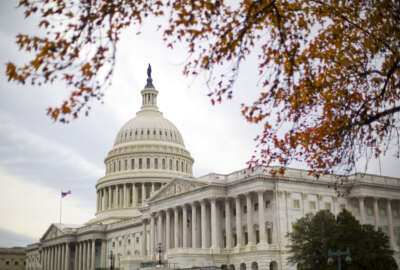
Medicare Part B — What would Shakespeare do?
If Shakespeare was a government employee now, which health plan would he pick? Mike Causey says Medicare to B or not to B, that's the question.
If William Shakespeare were alive today, say as a GS-13 at the Library of Congress, he’d have some tough choices to make. The federal health insurance open season ends next Monday. At age 452, he would naturally have some health concerns. The royalties on his 38 plays and 154 sonnets would have dried up long ago, so retirement planning would be a must. When he wrote the famous lines “To be or not to be …” many scholars — like me —believe he was, like tens of thousands of federal worker and retirees, weighing the pros and cons of Medicare Part B.
Because of this, uh, unusual election year, many families either banned or danced around the subject of politics at our just-concluded Thanksgiving banquets. Instead, in lots of federal houses — especially if the patriarch/matriarch is a retired fed, that left the deadly dull, but very import, subject of Medicare Part B as the issue de jour. Most Americans automatically get Medicare Part A — hospitals — based on their work histories, no matter where they worked. But Part B (doctors) is something they must pay for in a monthly premium. And while it is essential for some people, others, thanks to their health plans, can get pay without it. Which begs the question:
Medicare. To B or not to B?
So we asked David Snell. In addition to being a Shakespearean scholar, he is also director of the federal benefits department at the National Association of Retired Federal Employees. The question was Medicare Part B, yes or no? Who needs it? Who doesn’t? What are the pros and cons? And he said that like many important life, medical and financial questions, the answer is ‘it depends.’ Especially when the question is about enrolling in Part B when your federal health plan is secondary coverage.
- Pros – Whether you are enrolled in a fee-for-service nationwide plan or in an HMO, if you want to go out of the preferred provider network or outside of an HMO’s network/service area for services, 70 percent of the bill will be covered by Medicare. Many, if not all, of the fee-for-service plans such as BCBS, GEHA, MailHandlers, will waive the plan’s co-pays, deductibles, and coinsurance if the enrollee is covered by Parts A and B. Your out-of-pocket expenses will be low, usually zero. Many of the FEHBP plans also offer additional incentives for enrolling in Medicare.
- Cons – You will need to pay a monthly premium for Part B that at the very least in 2017 will cost you $109 per month /$1,308 per year for those having their premiums withheld from their SS checks, and $134 per month/$1,608 per year for those who do not receive SS benefits. This premium is in addition to the monthly FEHBP premium. That’s a lot of out-of-pocket premium expense for what amounts to duplicate coverage of the benefits offered under all of the FEHBP plans.
- Warning: If you wait too long after reaching age 65 to enroll in Part B, you will be subject to a late enrollment penalty of an additional 10 percent on top of the current premium for every year after age 65 you delayed enrolling.”
It’s a tough question for many people, but one they must (or should) understand and deal with. Now!
Nearly Useless Factoid
“Rubber Duckie,” the song sung by Ernie of the Muppets, reached #16 on the Hot 100 on Sept. 26, 1970.
Source: Wikipedia
Copyright © 2025 Federal News Network. All rights reserved. This website is not intended for users located within the European Economic Area.
Mike Causey is senior correspondent for Federal News Network and writes his daily Federal Report column on federal employees’ pay, benefits and retirement.
Follow @mcauseyWFED




